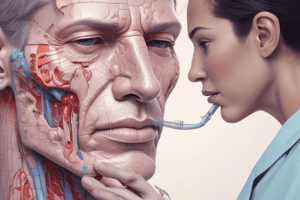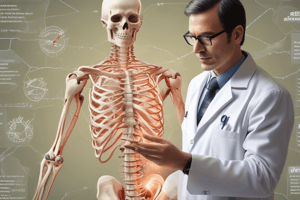Podcast
Questions and Answers
What does 'poor health' best describe in the context of the elderly patient?
What does 'poor health' best describe in the context of the elderly patient?
- Improper nutrition and health care (correct)
- Chronic illness management
- Aging process and disabilities
- Lack of physical activity
What does 'relatively good health' mean in reference to a patient with arthritis and eczema?
What does 'relatively good health' mean in reference to a patient with arthritis and eczema?
- Being free from any chronic conditions
- Maintaining a structured diet
- Experiencing frequent complications
- Able to function and have a quality of life that suits her (correct)
Which best defines 'failing health' as experienced by an elderly patient?
Which best defines 'failing health' as experienced by an elderly patient?
- In deteriorating condition and may die (correct)
- Recovering from a previous illness
- Maintaining a stable health condition
- Experiencing minor ailments
What does 'professional caring' imply in the nursing context?
What does 'professional caring' imply in the nursing context?
How is 'competent' best defined for a nurse?
How is 'competent' best defined for a nurse?
What does 'health challenge' refer to in the context of diabetes?
What does 'health challenge' refer to in the context of diabetes?
In the context of multiculturalism, what does 'melting pot' imply?
In the context of multiculturalism, what does 'melting pot' imply?
What does 'lived experience' indicate regarding health challenges?
What does 'lived experience' indicate regarding health challenges?
How can conscience be best described?
How can conscience be best described?
Doctors have full authority over all aspects of patient care. What is the correct statement?
Doctors have full authority over all aspects of patient care. What is the correct statement?
Are physiotherapists always excluded from health-care teams?
Are physiotherapists always excluded from health-care teams?
Collaboration within the health-care team excludes the patient. Is this statement true or false?
Collaboration within the health-care team excludes the patient. Is this statement true or false?
Do patients have no choice in the type of care they receive?
Do patients have no choice in the type of care they receive?
Nurses and dieticians add valuable contributions to patient care planning. Is this statement true or false?
Nurses and dieticians add valuable contributions to patient care planning. Is this statement true or false?
What is defined as the actual practice of medicine in diagnosing and treating disease?
What is defined as the actual practice of medicine in diagnosing and treating disease?
What is the term for the comprehensive assessment and care provided by a specialized team in a medical setting?
What is the term for the comprehensive assessment and care provided by a specialized team in a medical setting?
What does the term 'ambulatory patients' refer to?
What does the term 'ambulatory patients' refer to?
Which instrument is specifically used for viewing the internal structures of the eye?
Which instrument is specifically used for viewing the internal structures of the eye?
Which of the following is NOT a component of a complete physical examination?
Which of the following is NOT a component of a complete physical examination?
What does 'vital signs' refer to in a medical context?
What does 'vital signs' refer to in a medical context?
Which of the following best describes 'palpation'?
Which of the following best describes 'palpation'?
Which method involves the act of striking the body to determine sound quality?
Which method involves the act of striking the body to determine sound quality?
The term 'clinician' relates to care that is focused on which aspect?
The term 'clinician' relates to care that is focused on which aspect?
In medical terms, what is referred to as a 'sign'?
In medical terms, what is referred to as a 'sign'?
What does the term 'holistic' refer to in the context of health?
What does the term 'holistic' refer to in the context of health?
Which of the following best defines 'health promotion'?
Which of the following best defines 'health promotion'?
What is the most appropriate definition of 'needs' in the context of health?
What is the most appropriate definition of 'needs' in the context of health?
Which option best describes a 'passive receiver'?
Which option best describes a 'passive receiver'?
What does the term 'disease' indicate?
What does the term 'disease' indicate?
Which term best describes the action of 'collaborate'?
Which term best describes the action of 'collaborate'?
The word 'prevention' can best be described as:
The word 'prevention' can best be described as:
In health terminology, what does 'cure' refer to?
In health terminology, what does 'cure' refer to?
What does the term 'community relationships' imply in health contexts?
What does the term 'community relationships' imply in health contexts?
What is meant by 'optimal well-being'?
What is meant by 'optimal well-being'?
What aspect does the family history in a medical history primarily evaluate?
What aspect does the family history in a medical history primarily evaluate?
Which term describes a condition that is severe but brief in duration?
Which term describes a condition that is severe but brief in duration?
What does the term 'malignant' refer to in medical terminology?
What does the term 'malignant' refer to in medical terminology?
What is the primary purpose of taking a medical history?
What is the primary purpose of taking a medical history?
Which statement accurately defines 'atrophy'?
Which statement accurately defines 'atrophy'?
What information does the term 'benign' convey regarding a disease?
What information does the term 'benign' convey regarding a disease?
What does the prognosis of a disease indicate?
What does the prognosis of a disease indicate?
Which of the following best describes 'sign' in medical terminology?
Which of the following best describes 'sign' in medical terminology?
Flashcards are hidden until you start studying
Study Notes
Clinical Medicine
- Clinical Medicine refers to the practice of medicine in diagnosing and treating diseases. The term "clinical" originates from the Greek word "kliné" meaning "sick bed."
- Ambulatory patients can walk around, while inpatients are confined to bed.
- Medical doctors (MDs) or physicians examine and diagnose patients.
Diagnosis
- Diagnosis involves a complete examination of the body and mind, along with a detailed medical history.
Physical Examination
-
Complete physical examination comprises five aspects:
- Inspection: visually examining the patient
- Palpation: feeling specific areas of the body
- Auscultation: listening to internal organ sounds
- Percussion: striking various parts of the body to assess sounds
- Vital signs: measuring temperature, pulse, respiratory rate, and blood pressure (T, P, R, BP)
-
Signs are objectively measurable changes in the patient's body or bodily functions.
Medical History
-
Medical history encompasses past events that may be relevant to the patient's current health. It includes:
- Family history: diseases in family members
- Presenting symptoms (chief complaint): the reason for seeking medical attention
- Past history: previous illnesses
- Social history: marital status, living conditions, etc.
-
The information from the physical examination and medical history is documented in the medical record.
Diagnosis Terminology
- Acute: short and severe condition
- Ambulatory: able to walk around
- Anomaly: irregularity or deviation from normal
- Atrophy: wasting away of a body part or organ
- Benign: non-fatal disease
- Chronic: recurring or long-lasting condition
- Diagnosis: identification of a disease
- Malignant: progressively worsening condition that can be fatal
- Metastatic: disease spreading from one place to another
- Prognosis: prediction of the course of a disease
- Sign: objectively observable occurrence indicating a disease
- Symptom: subjective feeling or sensation experienced by the patient
Studying That Suits You
Use AI to generate personalized quizzes and flashcards to suit your learning preferences.




